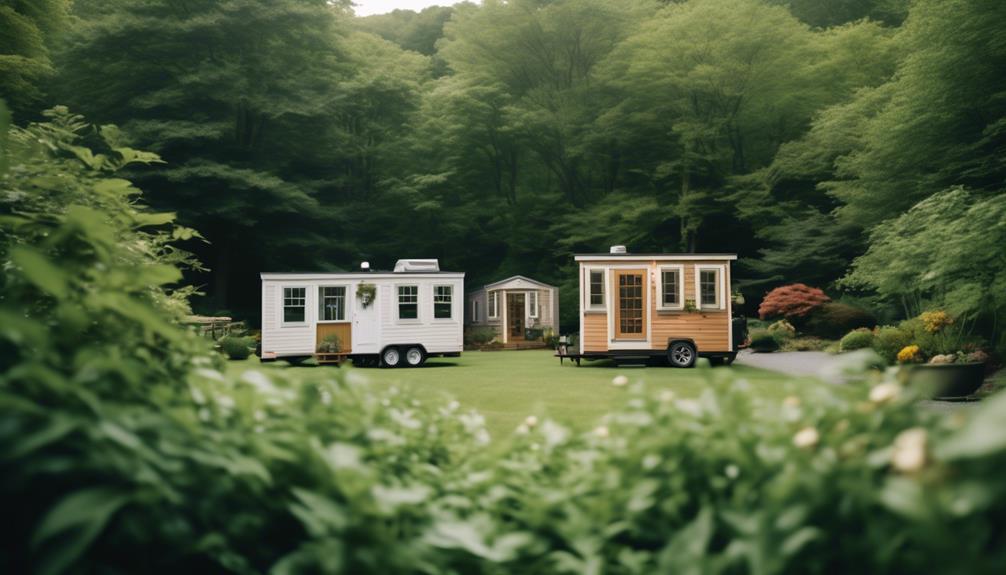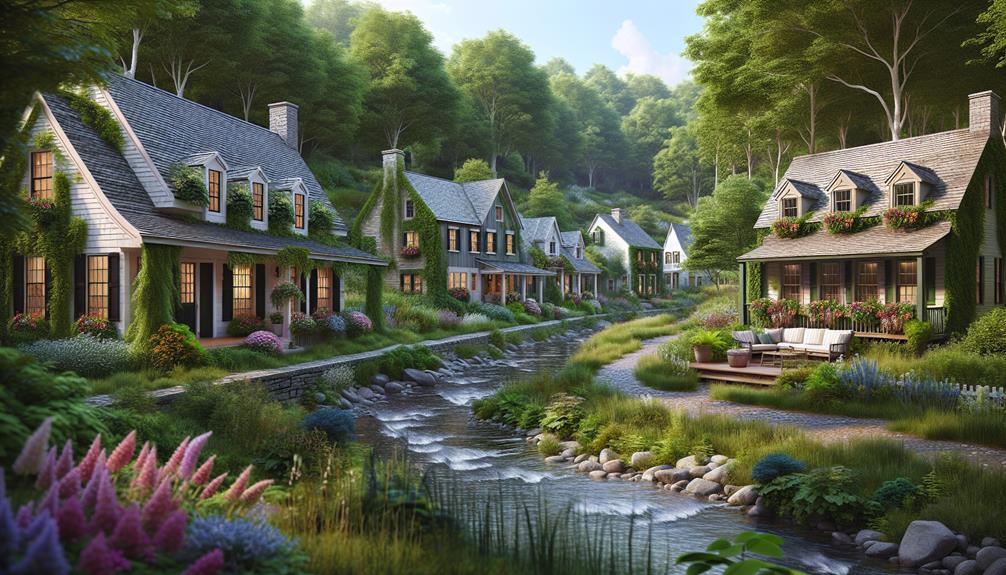Connecticut, with its enchanting landscapes and quaint towns, has emerged as a sought-after destination for those seeking the allure of tiny house living. As the tiny house movement gains momentum nationwide, Connecticut has responded by adopting zoning ordinances and building codes to accommodate these unique dwellings.
However, the legal landscape surrounding tiny houses in the state remains somewhat ambiguous. In this article, we will delve into the legal aspects, costs, and tiny house-friendly cities in Connecticut, as well as explore reputable builders and trailer dealers in the region.
Whether you're intrigued by the minimalist lifestyle or simply curious about the tiny house haven that Connecticut offers, join us as we uncover the untapped potential of this charming New England state.
Key Takeaways
- Tiny houses are legal in Connecticut, but there are no specific statewide laws or regulations regarding them. Local zoning and building codes determine the legality of tiny houses in different areas.
- Some cities in Connecticut, such as Madison, Norwich, and Willington, have embraced tiny houses and have created zoning ordinances to accommodate them. Tolland County is also considered one of the more tiny-house friendly counties in the state.
- The adoption of Appendix Q in 2020 improved regulations for tiny living in Connecticut. This appendix legalizes lofts and addresses specific requirements for tiny houses, including minimum ceiling heights, floor area, and egress requirements.
- The cost of a tiny house in Connecticut typically ranges from $30,000 to $90,000, depending on factors such as size, design, materials, and amenities. Building a DIY tiny house can be more cost-effective, and additional costs may include land, utilities, permits, and customization.
Tiny House Legality in Connecticut
In Connecticut, the legality of tiny houses is determined by local zoning and building codes. It is important to check with local authorities and obtain necessary permits before building or living in a tiny house.
While there are no specific laws or regulations regarding tiny houses in the state, some cities in Connecticut have embraced tiny houses and have created zoning ordinances to accommodate them.
However, challenges may arise when obtaining permits for tiny houses in Connecticut. Gray areas still exist regarding what is allowed in different areas, and it is essential to navigate the regulations effectively.
Despite these challenges, the benefits of tiny house living in Connecticut are numerous. From a more affordable and sustainable lifestyle to the freedom of mobility and the opportunity to live closer to nature, tiny houses offer innovative solutions for those seeking a simpler, more intentional way of living.
Tiny House Costs in Connecticut
The financial aspect of tiny house living in Connecticut is an essential consideration, as the costs associated with building or purchasing a tiny house can vary depending on factors such as size, design, materials, and amenities. Here are three key points to consider:
- Tiny House Financing: There are various financing options available for tiny house enthusiasts in Connecticut. These include personal loans, RV loans, and construction loans. It is important to research and compare different lenders to find the best terms and rates for your specific needs.
- Tiny House Zoning Regulations: Zoning regulations play a crucial role in determining where you can place your tiny house. Each city or town in Connecticut may have its own regulations regarding minimum lot sizes, setbacks, and utility connections. It is important to thoroughly research the zoning regulations in your desired location before starting the building process.
- Additional Costs: In addition to the cost of the tiny house itself, there are other expenses to consider. These may include land costs, utility hookups, permits, and customization. Creating a budget and carefully planning these additional costs will help ensure a smooth and successful tiny house project.
Tiny House Friendly Cities in Connecticut

Madison, Norwich, and Willington stand out as tiny house friendly cities in Connecticut, with zoning regulations and ordinances that accommodate the construction and placement of tiny houses. These cities have embraced the concept of tiny house living and have created specific requirements such as minimum lot sizes, setbacks, and utility connections. In contrast, other cities in Connecticut may be open to tiny houses on a case-by-case basis. Tolland County is considered one of the more tiny-house friendly counties in Connecticut, attracting many tiny homeowners. Living in a tiny home full-time can be more challenging in cities compared to rural areas due to certain laws that make it difficult. However, it is not impossible to live in a tiny house in these cities, and contacting city municipalities can help determine possibilities and solutions.
| City | Zoning Regulations/Oridnances |
|---|---|
| Madison | Allows for the construction and placement of tiny houses with specific requirements such as minimum lot sizes, setbacks, and utility connections. |
| Norwich | Accommodates the construction and placement of tiny houses with specific zoning regulations and ordinances. |
| Willington | Allows for the construction and placement of tiny houses with specific requirements such as minimum lot sizes, setbacks, and utility connections. |
Living in a tiny house in Connecticut offers several benefits, including reduced expenses, a smaller ecological footprint, and increased mobility. However, challenges exist in navigating zoning regulations in the state. Each city has its own regulations and considerations for tiny house living, making it essential to understand and navigate the specific requirements. Some cities, like Hartford, have more stringent regulations that make it difficult to register a tiny house as a full-time dwelling. Despite these challenges, the tiny house movement continues to gain traction in Connecticut, with Madison, Norwich, and Willington leading the way as tiny house friendly cities.
Tiny House Builders in Connecticut
Craft & Sprout, a reputable tiny house builder with over 20 years of design and building experience, is based in Greenwich, Connecticut. They are known for their innovative approach to tiny house design and their use of sustainable building materials.
Craft & Sprout stays up-to-date with the latest tiny house design trends, ensuring that their builds are both aesthetically pleasing and functional. They prioritize using eco-friendly materials, such as reclaimed wood, bamboo, and recycled insulation, to minimize their environmental impact. Craft & Sprout also incorporates energy-efficient features, like solar panels and rainwater collection systems, to promote sustainability.
With their expertise and commitment to quality, Craft & Sprout is a top choice for those seeking a well-designed and environmentally conscious tiny house in Connecticut.
Tiny House Trailer Dealers in Connecticut

Continuing our exploration of the tiny house world in Connecticut, let's now turn our attention to the availability of trailers specifically designed for tiny houses in the state. When it comes to finding the perfect trailer for your tiny house project, there are a few options to consider. Here are three reputable trailer dealers in Connecticut that offer a range of trailers suitable for tiny houses:
| Trailer Dealer | Location | Services/Products Offered |
|---|---|---|
| Tiny Foundations Northeast | Madison | Trailers specifically designed for tiny houses |
| Connecticut Trailers | Bolton | Wide variety of trailers for different purposes, including tiny houses |
| Elm City Trailer | Woodbridge | Trailers and related products like trailer hitches and receivers |
These dealers can provide you with the trailers you need to get started on your tiny house journey. Remember to research and compare different options to find the best fit for your project. Additionally, consider factors such as financing options and trailer maintenance to ensure a smooth and successful build.
Practical Considerations for Tiny House Living in Connecticut
Living in a tiny house in Connecticut requires careful consideration of various practical factors. Here are some key considerations to keep in mind:
- Zoning regulations: Before building or living in a tiny house, it is essential to check with local authorities regarding zoning regulations. Different areas may have specific requirements and restrictions for tiny houses.
- Building permits: Obtaining the necessary building permits is crucial to ensure that your tiny house meets all safety and construction standards. Make sure to research the requirements and follow the proper procedures to avoid any legal issues.
- Utilities and infrastructure: Consider the availability of utilities such as water, electricity, and sewage connections. Depending on the location, you may need to make arrangements for off-grid solutions or alternative sources of energy.
Living in a tiny house can be a rewarding and innovative lifestyle choice, but it is important to navigate the practical considerations to ensure a smooth and legal experience.
Frequently Asked Questions
Are There Any Specific Requirements for Loft Design and Safety in Connecticut's Tiny House Regulations?
In Connecticut, specific requirements for loft design and safety are outlined in the adoption of Appendix Q in the 2018 International Residential Code. These regulations cover minimum ceiling heights, floor area, egress requirements, obstructions, and loft guards to ensure safety in tiny houses.
What Are the Average Costs of Land, Utilities, Permits, and Customization for a Tiny House in Connecticut?
The average costs for building a tiny house in Connecticut can vary based on factors such as size, design, materials, and amenities. It is advisable to create a budget and research different options before deciding on a specific tiny house. Financing options and grants may be available for those seeking financial assistance.
Are There Any Other Cities in Connecticut Besides Madison, Norwich, and Willington That Allow for the Construction of Tiny Houses?
Alternative cities for tiny house construction in Connecticut include Tolland County, known for its more accommodating regulations and welcoming environment. Other cities may also consider tiny houses on a case-by-case basis, with specific requirements for construction and placement.
Can You Provide a List of Additional Tiny House Builders in Connecticut and the Surrounding Region?
When it comes to tiny house builders in Connecticut and the surrounding region, there are several options to consider. Some notable builders include Craft & Sprout in Greenwich, Tiny House Northeast in Wakefield, and Brady Built Tiny Houses in Auburn.
What Factors Should Be Considered When Choosing a Trailer for a Tiny House in Connecticut?
When choosing a trailer for a tiny house in Connecticut, factors to consider include the size and weight of the house, the specific design requirements, and compliance with local zoning regulations. It is important to choose a trailer that meets the specific needs and requirements of the tiny house design, ensuring it is safe, secure, and road-worthy.
Conclusion
In conclusion, Connecticut offers a haven for tiny house enthusiasts with its welcoming cities and favorable zoning ordinances.
The adoption of Appendix Q in 2020 has further improved regulations for tiny living, ensuring certain standards are met.
While the cost of a tiny house can vary, there are options available for every budget.
Whether you're interested in building your own tiny house or purchasing one from a reputable builder or trailer dealer, Connecticut provides a supportive environment for embracing a simpler and more sustainable way of living.

